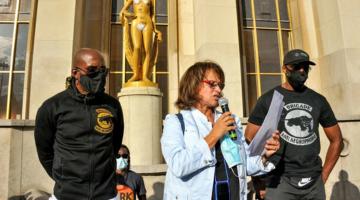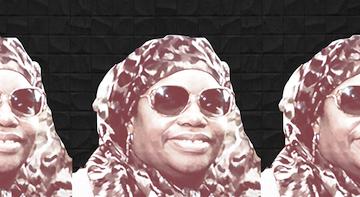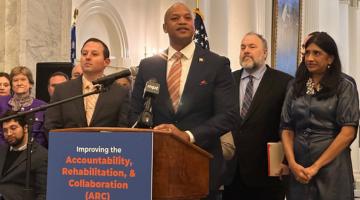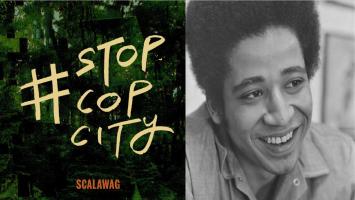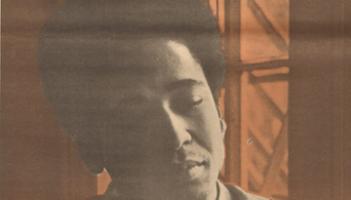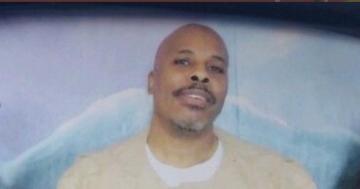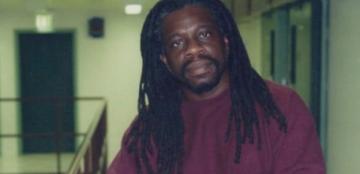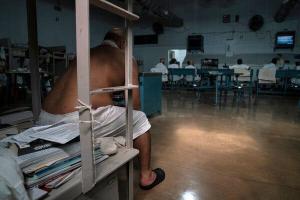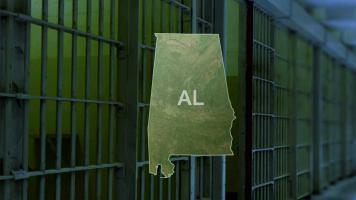The late Nehanda Abiodun was an African American revolutionary who exemplified the movement to end national oppression and the criminalization of a people.
This article was originally published in News Ghana.
Black August Series No. 4
Since the early 1980s, the prison population in the United States has grown exponentially with African Americans, Latin Americans and other working class people making up the majority of those incarcerated in the dungeons of the world’s leading capitalist state.
During the previous decade on September 9, 1971, several thousand inmates at the Attica Prison in New York State took control of the correctional facility to demand radical changes in the way people are treated while incarcerated.
Less than three weeks prior to the Attica Rebellion on August 21, George L. Jackson (1941-1971), was martyred during an escape attempt from San Quentin prison in California. One year earlier on August 7, 1970, George Jackson’s younger brother, Jonathan Jackson, just 17-years-old at the time, was killed along with William Christmas and James McClain. Jonathan Jackson had walked into a Marin County, California courtroom where Christmas, McClain and Ruchell Cinque Magee were on trial. Christmas, Magee and McClain were given weapons by Jonathan Jackson as they took Superior Court Judge Harold Haley, prosecutor Gary Thomas and three jurors hostage.
As they walked the hostages outside the courthouse and into a rented van, other law-enforcement officers opened fire on the vehicle killing Jackson, McClean, Christmas and Judge Haley. Ruchell Magee was wounded and was the only survivor among the armed guerrillas. These events were covered widely in the corporate press. Later that same year, George Jackson would publish his book of prison letters entitled “Soledad Brother.”
Angela Davis, at the time a member of the Communist Party, was terminated from her teaching position at the University of California at Los Angeles (UCLA) during 1969. The then Governor Ronald Reagan deliberately interfered with the administration of colleges and universities throughout the state. The year before in 1968, the longest student strike in U.S. history took place at San Francisco State College, where an alliance led by African Americans, fought pitched battles to make sure the institution did not function on a normal basis. The SFSC strike of 1968-69 included at one point the faculty union which was under attack by the board of regents and Reagan.
Davis later became involved with the Soledad Brothers Defense Committee in 1970 and worked with Jonathan Jackson in political and legal efforts to exonerate his older brother George. Law-enforcement and media sources claimed that the guns utilized in the Marin County rebellion led by Jonathan Jackson were registered in the name of Angela Davis.
As prosecutors in Marin County focused on Davis as a suspect in an alleged conspiracy, the professor and activist went underground for two months. She was captured and imprisoned in October 1970. An international political and legal process would result in her acquittal on all charges by the summer of 1972.
It was the African American inmates which led the Attica insurrection in 1971 after being politicized by the numerous organizations operating on the outside including the Black Panther Party (BPP), Nation of Islam and the Young Lords Organization (YLO). The advent of the movement for Civil Rights and Black Power during the 1960s attracted thousands of youth activists who were committed to total freedom within their lifetimes.
Nehanda Enters the Struggle for Black Liberation
One such young person was Nehanda Abiodun of New York City. Abiodun had been politicized through the housing struggles in West Harlem which opposed the expansion of Columbia University that would displace African Americans. Her parents were activists and would have a profound influence on Nehanda’s political trajectory.
Abiodun studied at Columbia University and worked as an organizer for the West Harlem Community Organization (WHCO). During her tenure with the WHCO, she and other co-workers realized that the injustices they were fighting stemmed from the inherent racist and exploitative system of U.S. capitalism. As the years passed she was influenced by the emerging BPP.
While working at a methadone clinic in New York during the period of widespread heroin addiction among Black and Brown peoples, she realized that other methods of addressing the drug crisis were needed. She would join the efforts of Dr. Mutulu Shakur at the Hamilton Hospital clinic in the Bronx during the late 1970s. The clinic which utilized acupuncture and other methods to treat substance abuse, posed a direct threat to the federal government sponsored methadone maintenance programs. The clinic at Hamilton was closed by the City of New York in 1978.
Later Dr. Shakur would reopen a clinic in Harlem in defiance of the city administration. The people around the acupuncture clinic were treated for drug addiction, however, there was a political education component which taught the impoverished patients that their conditions were rooted in the history of racism and capitalism in the U.S.
After the liberation from maximum security prison in New Jersey of Black Liberation Army (BLA) cadre Assata Shakur on November 2, 1979, the Federal Bureau of Investigation (FBI) and local law-enforcement agencies began dragnet operations against members and supporters of several revolutionary organizations including the BLA, the Republic of New Africa, Weather Underground and the May 19th Communist Organization.
When a Brink’s armed robbery was carried out on October 20, 1981, in an area north of NYC resulting in the deaths of one security guard and two Nyack, New York police officers, the FBI and state authorities began to arrest members of the organizations working with the Black Acupuncture Advisory Association of North America (BAAANA). The BLA, Weather Underground and the May 19th Communist Organization were targeted for death and incarceration.
Abiodun went underground during this period and eventually would surface in the Republic of Cuba during the early 1990s. She was granted political asylum along with Assata Shakur and other activists from the U.S. who were being pursued by federal and local police agencies.
In an interview with Abiodun she discussed her political life: “In 1982 a federal warrant was issued for my arrest for violating the Rico Racketeering and Conspiracy laws. I choose to go underground for political reasons and while living clandestinely I learned how important it is to struggle from a position of love and not hate. It was the love of humanity, freedom and justice that were the dictates that led me to where I was then, and the love given from comrades that kept me mentally and spiritually healthy when I thought that I would die from a broken heart because of being separated from my family. And be assured that it is that same kind of love that has given me the resolve to continue daily in our quest for freedom. I recognize how blessed I am to have so many beautiful people in my life that genuinely care for me, individuals who are willing to make the sacrifices needed to carry on the traditions of principled struggle.”
Her work in Cuba included the promotion of young artists influenced by the hip hop movement in the U.S. and internationally. She along with Assata Shakur represented the legacy of the Black Liberation Movement and its victories. In 2019, Abiodun died in Cuba leaving a profound history of local, national and global struggles.
Prison Industrial Complex Continues to Grow in the U.S.
Since the 1970s and 1980s, the number of people incarcerated in the U.S. has continued to be a cause for concern for the African American liberation struggles. A series of laws and policy measures have resulted in the rapid expansion of the prison population.
These laws and measures include the growth in the numbers of police officers; draconian local, state and federal legislation which have stiffened penalties for crimes; the further deterioration of public school systems in rural, suburban and urban areas leaving millions uneducated and prone to arrest and imprisonment; federal programs which provide military grade weapons to local and state police agencies therefore encouraging the use of deadly force; an escalation in illicit narcotics use which has captured millions in a cycle of dependency and criminalization.
In an entry published by the Sentencing Project website it emphasizes that: “The United States is the world’s leader in incarceration. There are 2 million people in the nation’s prisons and jails—a 500% increase over the last 40 years. Changes in sentencing law and policy, not changes in crime rates, explain most of this increase. These trends have resulted in prison overcrowding and fiscal burdens on states to accommodate a rapidly expanding penal system, despite increasing evidence that large-scale incarceration is not an effective means of achieving public safety.”
These grim statistics confirm what Nehanda Abiodun, Assata Shakur, George and Jonathan Jackson, among many others, have illustrated through their writings and activism. The existence of mass incarceration is clearly related to the racist, capitalist and imperialist system of the U.S. and its allies around the globe. Until these realities are transformed, the process of social containment and exploitation which the prison system represents will remain as a major impediment to the realization of liberated and just society.
Abayomi Azikiwe is the editor of Pan-African News Wire, an international electronic press service designed to foster intelligent discussion on the affairs of African people throughout the continent and the world.

